In order to evaluate the efficacy of agro-clusters for water management in Kyrgyzstan, this article conducted a literature review and employed survey methods. To find out more about farmers' knowledge, interests, and perceptions of agro-cluster development activities, a systematic survey was carried out. Furthermore, an assessment of extant literature was carried out in order to formulate a theoretical framework and pinpoint potential advantages of agro-clusters. All of the respondents agreed, based on the analysis of the questionnaire responses, that agro-clusters can enhance agricultural practices and support sustainable water management. The two biggest obstacles were the expensive cost of new equipment and the restricted availability of water sources. The necessity for government support in enhancing agricultural water management was also highlighted by the respondents. A review of the literature that focused on the potential of agro-clusters to lower resource costs, develop ecologically friendly farming techniques, and boost agricultural output bolstered these conclusions. Overall, this study advances knowledge about the growth of agro-clusters and their implications for Kyrgyzstan's sustainable agricultural development and water management, highlighting the necessity of stakeholder collaboration in resolving issues and maximizing agro-cluster potential.
Keywords: agro-clusters, water resources management, agriculture, Kyrgyzstan, sustainable development, government support, survey, infrastructure development, water use.
The effective use of agro-clusters has emerged as a crucial tactic in the effort to increase agricultural efficiency and sustainability. This study focuses on a thorough examination of how well agro-clusters perform water management optimization in Kyrgyzstan's agricultural terrain. The study intends to determine the degree of farmers' awareness of agro-clusters and their inclination to engage in them using a survey methodology.
The primary goal of this research is to evaluate the concrete effects of agro-clusters on Kyrgyzstan's management of water resources. Farmers' understanding of agro-cluster concepts, desire in joining, and opinions of the possible advantages of this cooperative approach were all gathered through the use of a well crafted, organized questionnaire. The questionnaire was put through a rigorous pre-testing process before it was put into use to make sure the phrasing was accurate and clear.
Carefully chosen farm properties, comprising both small and major farmers, were representative of Kyrgyzstan's several regions. A comprehensive understanding of the current trends and patterns regarding farmers' perceptions of agro-clusters and their anticipated advantages was made possible by the sample's diversity.
The cluster strategy was recently introduced in Kyrgyzstan, which indicates a strategic shift towards encouraging farmer cooperation, maximizing resource usage, and facilitating information sharing. The goal of this essay is to present a comparative analysis of how agro-cluster integration has transformed the agriculture industry. It highlights how the cluster strategy has the innate capacity to not only lessen current issues but also steer the industry in the direction of a more viable and sustainable future.
Examining the dynamic changes that are seen in a number of areas, such as production levels and infrastructure development, as a result of the establishment of agricultural clusters is at the heart of this research. This study aims to contribute significantly to the larger conversation on modernizing agricultural methods by illuminating these revolutionary shifts and strengthening the agricultural sector's resilience and sustainable growth in Kyrgyzstan.
Literature review
Researchers and experts are becoming more and more interested in the Kyrgyz Republic's water resources and how they are used for agriculture. The primary components of water resource utilization for irrigation and sensible water consumption in agriculture in Kyrgyzstan are examined in Asylbek Esenamanov's work [4], which also emphasizes water policy in Central Asian nations.
Even though agriculture's share of the GDP is relatively low in Kyrgyzstan, the country's economy greatly depends on its irrigated agricultural output. Irrigated areas, however, face with inconsistent access to water and inefficient water use. The region's ability to support agriculture is under threat by a lack of water for irrigation [6].
The data analysis makes it evident that Kyrgyzstan only utilizes a portion of its water resources, and not always effectively. The full realization of the potential to increase the utilization of surface and groundwater resources is impeded by various constraints, including poor farm solvency, failing infrastructure, and inadequate finance.
Water resource management is further complicated by issues with interstate water allocation in the area, particularly in the Syrdarya basin. Reduced water withdrawals and unstable water supplies have a detrimental impact on the region's ecosystem and agriculture. In general, the study of water resources and their use in agriculture in Kyrgyzstan reveals the need to implement effective water management strategies to ensure sustainable development of agriculture and the economy of the country [1].
Several steps must be performed in order for agro-clusters in Kyrgyzstan to flourish successfully. It is critical to expand cluster members' funding and give them access to lower-interest loans, subsidies, and other financial aid. Creating well-defined incentives for cluster members is also essential to boost their drive for collaboration and creativity.
In order to foster productive communication among stakeholders involved in cluster development, it is recommended that a working body or platform be developed to facilitate coordination and the sharing of expertise and experience among members. A platform like this can play a major role in aiding and encouraging the establishment of agricultural clusters [2].
Furthermore, it's critical to offer technological support for the expansion of agricultural production capacity. This could involve helping groups that conduct research and provide training, as well as supporting the growth of non-governmental organizations and farmers' associations.
But in addition to these steps, issues with the infrastructure of agriculture must also be resolved. Agro-cluster expansion and resource efficiency are impeded by inadequate infrastructure development, including trade and logistics hubs, cold chain facilities, and product certification systems.
Generally speaking, a thorough strategy that considers funding, incentives, coordination, technical assistance, and infrastructure development is necessary for the effective development of agrarian clusters in Kyrgyzstan. Only this strategy would guarantee the country's agro-industrial complex grows sustainably and optimize cluster development potential [10].
Methodology
I conducted a questionnaire survey as part of the research procedure to find out how much farms knew about agro-clusters and whether they would be interested in joining one. Assessing the usefulness of agro-clusters for Kyrgyzstan's water resource management was the main objective of the survey. The survey was created and disseminated via Google Forms to Kyrgyz farmers who are either current members of or plan to join agro-clusters.
In order to do this, a well-organized survey was created that asked participants about their interest in getting involved with agro-clusters, their understanding of the idea, and their thoughts on the potential advantages of implementing agro-clusters for water resources.
Small and large farmers were included in the representative sample of farm households that we assembled from various parts of the nation. After that, we carried out a survey by giving farmers questionnaires to fill out on their own.
Statistical techniques were applied in the processing and analysis of the collected data. We determined the primary trends and patterns pertaining to farmers' perceptions of the possible advantages of agro-clusters and their degree of knowledge about them.
Results and Discussions
In this section, we present findings of the survey conducted among 26 respondents, mostly farmers, to ascertain their views on agro-clusters and water management in Kyrgyzstan. The survey consisted of 10 questions aimed at assessing respondents' knowledge, interests, perceptions and concerns about agro-cluster development initiatives. Analysis of these responses provides valuable information on farmers' current understanding and attitudes towards agro-clusters and their potential impact on sustainable agricultural development. Having comprehensively reviewed the survey data, we have reviewed the key findings, discussed their implications, and offered recommendations for future research.
Analysis of answers to the question about the usefulness of creating agro-clusters for agriculture revealed unanimous agreement of all 26 respondents. Each respondent answered in the positive, which is 100 % of the total number of respondents.
This unconditional agreement emphasizes the widespread perception among the respondents that the establishment of agro-clusters offers great opportunities for improving agricultural practices. The overwhelming agreement reflects respondents' general understanding of the potential benefits associated with agro-cluster development.
These results indicate a high level of approval and recognition of the importance of agro-cluster development for agriculture among the people interviewed. This unanimous support serves as an important indicator of the perceived value and relevance of agro-cluster initiatives in the agricultural context of Kyrgyzstan.
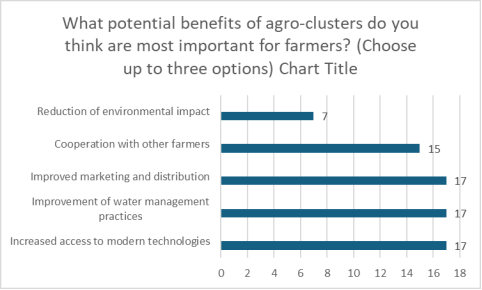
Fig. 1
Among the proposed options, several potential advantages of agro-clusters seemed particularly important to farmers:
– Increased access to modern technology.
– Collaboration with fellow farmers.
– Improved water management practices.
Based on respondents' answers, each of these benefits was selected as the most important several times. This suggests that farmers place high importance on aspects such as access to new technologies, opportunities for collaboration with peer farmers, and improved water management practices within agro-clusters.
Our discussion seeks to understand the practical implications of agro-cluster initiatives and their potential to address the key concerns and aspirations of farmers in Kyrgyzstan. By identifying the specific benefits of agro-clusters, we can better understand their role in promoting collaboration, innovation and sustainable agricultural practices in the country's agricultural sector.
Agro-clusters have the ability to encourage more sustainable use of water resources in agriculture, as indicated by the uniform «Agree» response from all answers to this question.
This research has significant ramifications for agro-cluster formation advocacy and for enhancing agro-clusters' capacity to advance sustainable agriculture. This might be accomplished by implementing water-saving technology, introducing contemporary irrigation systems, or using other creative strategies.
Considering that agro-clusters are essential to maintaining the sustainability of the use of water resources in agriculture, this conclusion can also be used as a foundation for the creation of programs and initiatives that are targeted at their assistance. We note that all respondents agreed that agro-clusters had the ability to increase the efficiency of water management, and we stress the need of giving these cooperative agricultural projects top priority and funding.
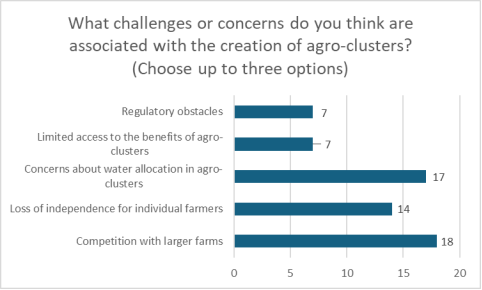
Fig. 2
Analysis of responses to this question yielded the following results:
– Competition with larger farms: 19 responses
– Loss of independence for individual farmers: 10 responses
– Concerns about water allocation in agro-clusters: 17 responses
These data indicate that survey participants consider competition with larger farms, loss of independence for individual farmers, and concerns about water sharing within agro-clusters to be the main problems or concerns associated with the establishment of agro-clusters.
By addressing these concerns and offering practical solutions, we aim to deepen understanding of the challenges associated with agro-cluster development and emphasize the potential of these collaborative initiatives to mitigate the challenges and increase the sustainability of agriculture in Kyrgyzstan.
Through analysis and discussion, we aim to provide valuable information for policy makers, agricultural stakeholders and researchers interested in promoting effective and inclusive agro-cluster development strategies. Addressing these challenges proactively will allow us to maximize the positive impact of agro-clusters on the agricultural sector and contribute to the overall development of sustainable agriculture in Kyrgyzstan.
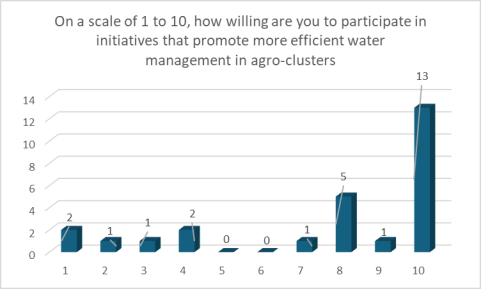
Fig. 3
The average score of participants' readiness to participate in activities on effective water resources management in agro-clusters is about 7.8 out of 10. This indicates a relatively high level of readiness of participants to actively participate in such endeavors.
This result emphasizes the significant interest and willingness of participants in initiatives aimed at improving water resources management in agro-clusters. The mean score indicates a strong propensity to proactively engage in efforts to improve water sustainability in agricultural settings.
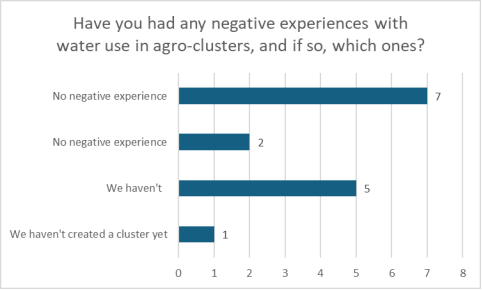
Fig. 4
Most comments indicate that most participants did not report negative experiences with water use in agro-clusters. However, it is noted that some participants had not yet experienced agro-clusters, which explains the lack of negative experiences.
These findings suggest that while negative experiences related to water use in agro-clusters may not be prevalent among participants, there remains an experience gap among some respondents. The lack of negative incidents reported by the majority of participants may indicate either a lack of awareness of certain aspects of agro-clusters or a generally positive perception of water management practices within existing agro-clusters.
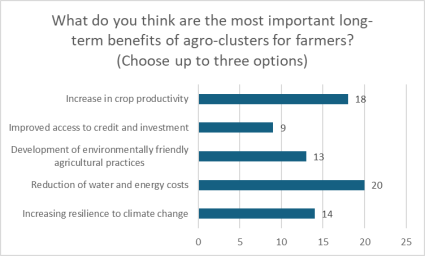
Fig. 5
Minimizing water and energy costs: Participants understand that by pooling resources and employing efficient management techniques, agro-clusters may maximize their use of both water and energy. Decreasing the cost of resources could assist farmers conserve a lot of money in the future, which will increase their efficiency and long-term viability.
Creating ecologically friendly agricultural methods: The emphasis placed on creating ecologically friendly methods of agriculture within agro-clusters is a sign that members are becoming more conscious of the significance of sustainable agriculture. Agro-clusters can assist farmers in decreasing their environmental effect while satisfying customer demand for ethical food production by supporting methods like integrated pest control, organic farming, and soil conservation.
Improving crop productivity: Agro-clusters have a chance for increasing agricultural productivity, as highlighted by the participants. Agro-clusters provide farmers with access to resources and knowledge that boost agricultural yields and quality through cooperative research, technology sharing, and economies of scale. In addition to helping individual farmers, these productivity gains also support regional and national economic growth and food security.
Acknowledging these enduring advantages underscores the revolutionary capacity of agro-clusters in molding the trajectory of agriculture in the future. Agro-clusters provide a comprehensive strategy for sustainable rural development by tackling major issues such resource scarcity, environmental degradation, and productivity limits.
The focus on cost-cutting highlights how profitable agro-clusters are for farmers as a business model. Farmers may obtain benefits of scale that would have been impossible by combining resources and sharing infrastructure, which makes them more competitive in both domestic and foreign markets.
Furthermore, the emphasis on eco-friendly methods is a reflection of a larger movement towards more sustainable agricultural systems. Farmers stand to gain from matching their methods with customer tastes for ecological and ethical products, which are becoming more and more popular. Agro-clusters offer a forum for cooperation and creativity in this field, encouraging actions that advance both economic growth and environmental care.
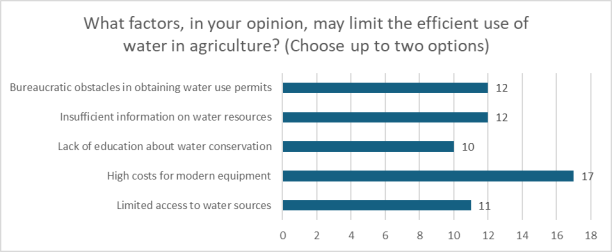
Fig. 6
Based on the responses, the following are the main problems preventing agriculture from using water efficiently:
– Limited access to water sources.
– The high price of contemporary gear.
A major barrier to raising agricultural output, particularly in areas with limited water resources, is restricted access to water sources. Agriculture cannot meet the water needs of their crops without sufficient accessibility to water for irrigation, which lowers crop yields and causes financial losses. Integrated water management techniques, such as development of infrastructure, water-saving measures, and equitable allocation methods, are required to solve this issue.
Furthermore, agriculture face serious economic challenges due to the high expenses associated with advanced equipment, particularly those on smaller farms and those operating in resource-constrained environments. To increase productivity and water use efficiency, expenditures in systems for irrigation, pumps, and other water-saving technology are required. Unfortunately, the initial outlay of funds necessary for the acquisition and upkeep of this equipment may be unaffordable, which would restrict its adoption and prolong resource inefficiencies.
Governments, consumers in the corporate sector, and nonprofit groups must work together to support farmers in utilizing water resources and implementing water-saving technologies in order to overcome these obstacles. To enhance agricultural systems' resilience to water-related risks, policy measures, financial incentives, and capacity building activities can be vital in encouraging sustainable water management practices. Stakeholders can increase food security, protect the environment, and support rural lives by tackling these barriers to more effective and sustainable water usage in agriculture.
In general, most respondents agree with the statement that financial support from the Cabinet of Ministers can significantly improve water management in agriculture. Presumably, respondents recognize the importance of government support for the development of infrastructure and technologies related to irrigation systems in agriculture. This may also indicate that respondents recognize the important role of the state in addressing water supply and management issues.
The presented answers show that all respondents believe that agro-clusters can contribute to the economic development of rural areas. This indicates a wide recognition of the potential of agro-clusters as a tool to stimulate economic growth and development of rural areas. Most likely, respondents see in agro-clusters an opportunity to pool resources, increase production efficiency, develop new markets and improve the living conditions of the rural population. However, the specific mechanisms and factors that make agro-clusters so useful for economic development may vary depending on the context and characteristics of specific regions.
Conclusion
We conducted a thorough analysis of questionnaire responses and existing literature to determine the effectiveness of agro-clusters for water management in Kyrgyzstan. Using a questionnaire survey method conducted as part of this study, we collected data from farmers on their understanding, preferences and opinions on agro-cluster development programs. A review of relevant literature also served as a theoretical basis for our analysis.
As part of our approach, standardized questionnaires were distributed to a sample of agricultural households from different regions of Kyrgyzstan. The findings of the survey revealed that participants have a high degree of awareness of agro-clusters, have a positive attitude towards them, and agree on how they can contribute to sustainable water management and improved agricultural practices. Furthermore, a considerable amount of interest was shown by respondents in taking part in agro-cluster activities targeted at enhancing water management, highlighting the efforts' tangible worth and applicability in Kyrgyzstan's agricultural context.
Key problems restricting the effective use of water in agriculture were identified through analysis of survey responses. These factors included the high price of modern technology and restricted access to water sources. These findings highlight how urgently stakeholders must work together to address these issues and advance sustainable agricultural water management techniques. Furthermore, in order to enhance agricultural water management, respondents underlined the significance of government support, notably financial help from the Cabinet Office [3].
Our analysis of the body of research offered insightful information about the possible advantages of agro-clusters, such as lower resource costs, the development of ecologically friendly farming methods, and higher agricultural output. These results validate the ability to transform of agro-clusters in determining the direction of agriculture in Kyrgyzstan and are in line with the opinions expressed by survey participants.
In summary, this research adds to the expanding corpus of information regarding the establishment of agro-clusters and their consequences for the utilization of water in Kyrgyzstan. Through the integration of survey and literature research data, we have produced a thorough examination of the advantages and disadvantages related to agro-cluster projects [8]. In the future, maximizing the potential of agro-clusters to advance sustainable agricultural growth and water management in Kyrgyzstan would require coordinated efforts by policy makers, agricultural stakeholders, and researchers.
References:
- Batykova A. Zh. (2014) Issues of the use of water resources of the Kyrgyz Republic // Bulletin of the Kyrgyz National Agrarian University. K. I. Scriabin. — N. 1(30). — P. 373–379
- Concept of Agrarian Development of the Kyrgyz Republic for 2021–2025, http://admin.koomtalkuu.gov.kg/uploads/npa_versions/6141ebd0033fa1.48745238.pdf, (date of research March 15, 2024)
- Dzhumalieva E. B., Amanturova Ch. K. (2019) Problems of efficient use of water resources in the Kyrgyz Republic // Bulletin of the Bokhtar State University named after. Nosira Khusrava. Humanities and Economics Series. N. 1–1 (59). — P. 202–205
- Esenamanov A. (2016) The use of water resources in agriculture of the Kyrgyz Republic // Problems of modern science and education. N. 24(66). — P. 33–39
- Imanaliev K. 2011. Water strategy of Kyrgyzstan. Bishkek: Slovo Kyrgyzstana. [Electronic resource https://for.kg/news-173308-ru.html (date of reference 10.10.2021)].
- Nuralieva, N. (2022). Water Potential of the Republic of Kyrgyzstan: Problems and Potentials of Economic Development. Arid Ecosystems. 12. 193–199. 10.1134/S207909612202010X.
- Porter, M. E. (1998). Clusters and the New Economics of Competition. Harvard Business Review, 76(6), 77–90.
- Omoshev T. T., & Kantoroeva G. K. (2021). Prospects of Development of Agriculture of the Kyrgyz Republic in Modern Conditions of Functioning of Economic Processes of the Agrarian Sector. Economics and Business: Theory and Practice, (2–2), 17–22. doi: 10.24412/2411–0450–2021–2–2–17–22
- Yusupova G. N. (2014) Water resources of the Kyrgyz Republic: economic and strategic advantages /G. N. Yusupova // Reform. N. 2(62). — P. 23–27
- Zulpukarov, A., & Akunzhanov, E. (2016). Cluster modernization of the economy of the agrarian sector of Kyrgyzstan. Territory of Science, (2), 79–83.

